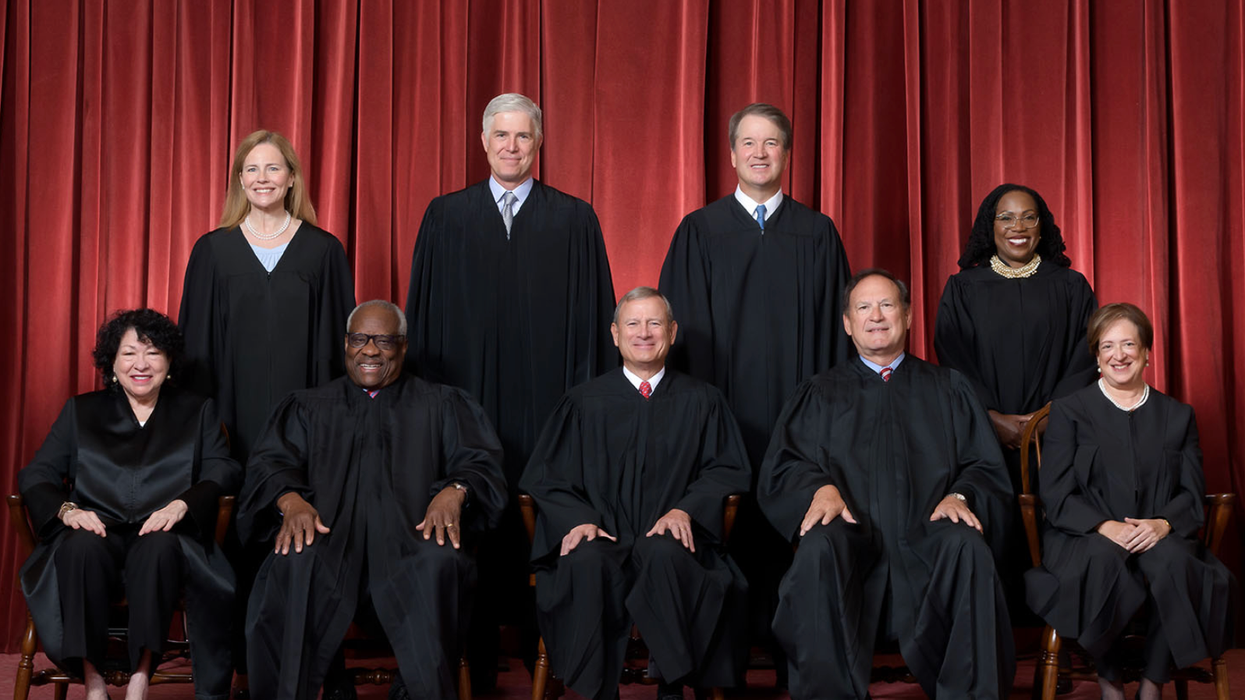Legal scholar praises 6-3 Supreme Court ISL ruling as 'very good news' for 'constitutional law'

Supreme Court 2022, Image via Fred Schilling, Collection of the Supreme Court of the United States
June 28, 2023 | 12:57PM ETBank
On Tuesday morning, June 27, the U.S. Supreme Court handed down its anxiously awaited decision in Moore v. Harper and ruled, 6-3, against a far-right legal doctrine known as the independent state legislature theory (ISL).
The ISL, in its most severe form, claims that state legislatures have the sole authority to decide a state's election laws — not the governor, not state supreme courts, not judges. MAGA Republicans made a pro-ISL argument in Moore v. Harper, saying that a state's executive and judicial branches should be totally excluded from election-related decisions.
But the ISL was too radical and extreme even for Justice Amy Coney Barrett and Justice Brett Kavanaugh, both appointees of former President Donald Trump.
READ MORE: Huge victory for democracy' as Supreme Court rejects fringe Trump-backed election theory
Barrett, Kavanaugh and Chief Justice John Roberts joined the High Court's three Democratic appointees — Justice Sonia Sotomayor, Justice Elena Kagan and Justice Ketanji Brown Jackson — in shooting down the ISL. The three GOP-appointed dissenters were Justice Clarence Thomas, Justice Samuel Alito and Justice Neil Gorsuch.
In an article published by the conservative website The Bulwark on June 27, University of Baltimore law professor and former federal prosecutor Kimberly Wehle lays out some reasons why the Roberts Court's Moore v. Harper ruling is a major victory for "constitutional law."
"When the Supreme Court handed down its decision on Tuesday in Moore v. Harper," Wehle observes, "the collective exhale among experts in voting rights and constitutional law was almost palpable. The case involved the so-called 'independent state legislature theory' — a cynical maneuver by Republican lawmakers and lawyers to essentially immunize state legislatures from any review whatsoever for passing anti-voting legislation, however draconian and however violative of state law…. The fact that Chief Justice Roberts, in his majority opinion, resoundingly put it to rest once and for all — despite the availability of a ready off-ramp — is very good news."
Nonetheless, Wehle finds it "alarming" that the High Court was even willing to consider the ISL in the first place.
READ MORE: Dark money groups pump nearly $90 million into "independent state legislature" case
"The theory went like this: By using the terms 'by the Legislature,' the Constitution's Framers meant to make state legislators the ultimate deciders of all things related to federal elections, unless Congress steps in," the law professor explains. "The theory is radical not only as a matter of common sense, but also, in light of core separation-of-powers principles, because it would have lodged unchecked power over federal elections in a dominant political party of elected state representatives, enabling them to override even their own state constitutions willy-nilly, and leaving the gerrymandered ballot box as the only recourse for voters wishing to ensure that lawmakers complied with the law."
Wehle continues, "Chief Justice Roberts, in no uncertain terms, killed the theory: 'The Elections Clause does not insulate state legislatures from the ordinary exercise of state judicial review.' Period.
READ MORE: 10 years after Supreme Court gutted voting rights, advocates urge Congress to reverse damage
Kimberly Wehle's full article for The Bulwark is available at this link.